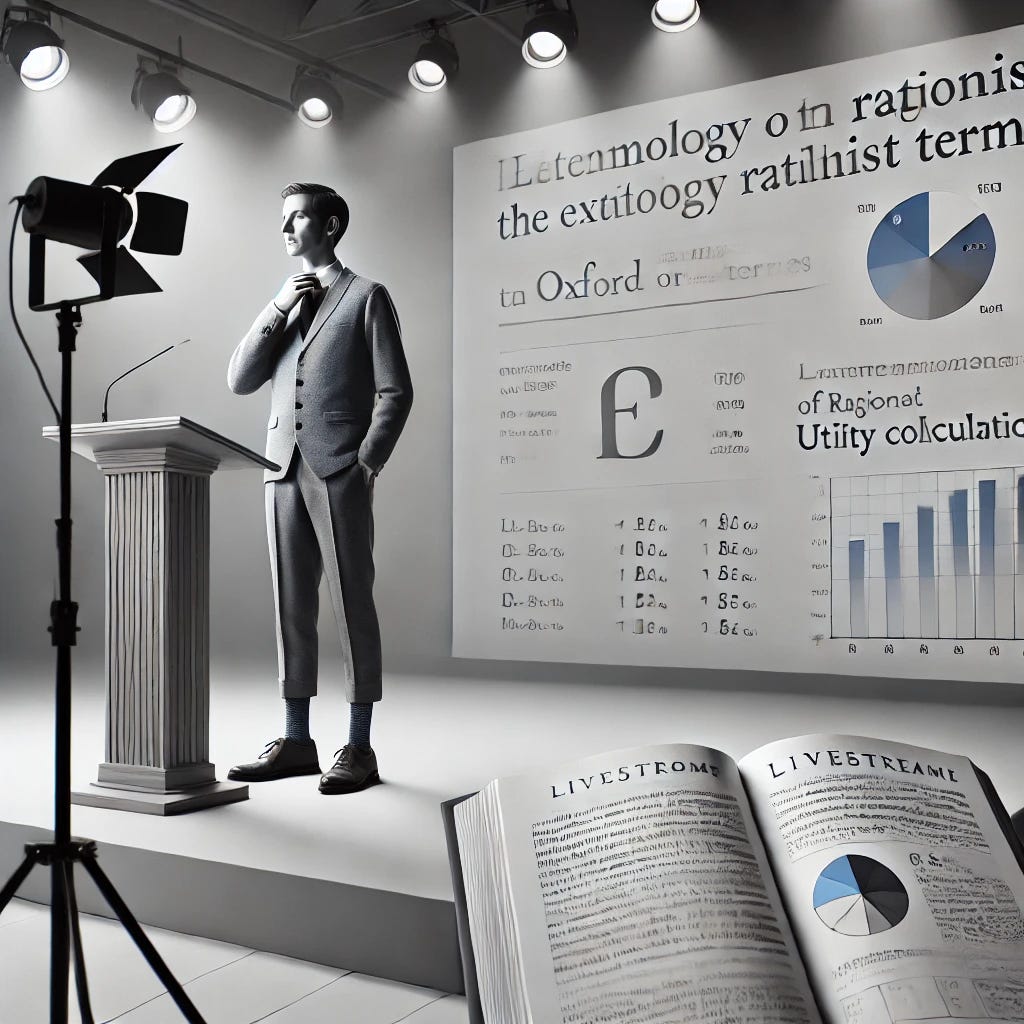Gr(a/e)y
Rationalism, Effective Altruism. 500 words, 2 minute read. With Claude Sonnet.
The CoinRational™ logo pulsed against the mahogany-paneled walls of Oxford's Sheldonian Theatre, its blockchain particles morphing between charcoal and slate. Below it, a hastily added banner proclaimed: "Defining Our Movement: The Gray/Grey Debate."
Eliezer drummed his fingers against his laptop, each tap following a precise Fibonacci sequence. His Berkeley conference badge hung slightly askew on his faded "P(doom) > .99" t-shirt. The screen before him displayed a dense array of probability distributions, though his eyes kept darting to the spell-checker settings.
Across the stage, Will adjusted his collar, Oxford blues gleaming under the livestream lights. His notebook lay open to a page filled with careful annotations on the etymology of various rationalist terms, the margins decorated with utility calculations.
"Before we begin our second segment," the moderator said, her cursor hovering over the debate transcript, "our viewers should note that this text is being rendered in real-time across multiple alphabets and encoding standards."
Eliezer cleared his throat. "I think we can all agree that the Gray Tribe moniker is the best path forward for our movement. Now, I've been analyzing our community's textual corpus-" He paused, squinting at Will's notepad. "I see you're already transcribing this with an 'e', which rather begs the question."
"Fascinating observation about the Grey Tribe movement." Will's fingers traced the edge of his notebook. "Though I couldn't help but notice you've set your keyboard to US-QWERTY. One might consider that an unstated prior in this discussion."
The audience's laptops clicked in scattered applause.
"Look," Eliezer said, pulling up a visualization that mapped citation networks across the rationalist blogosphere, "the data clusters naturally around American usage patterns. It's like watching memetic evolution in real-time."
Will leaned forward, his tea cooling forgotten beside his laptop. "Interesting that you mention evolution. The original DNA, if you will, of our movement traces back to these halls." His gesture encompassed the centuries-old beams above them. "I should know. I started it." He gestured broadly. "There's something to be said for preservation of information encoding."
In the front row, a young programmer from Google's AI ethics team whispered to her seatmate, "Is it just me, or are they really arguing about which side of the pond owns rationality?"
Eliezer's fingers flew across his keyboard, pulling up a prediction market he'd quietly launched during the opening remarks. "The market is currently pricing American spelling adoption at 64.7% probability. And markets, as we know-"
"Are less efficient in thin trading," Will interjected, bringing up his own screen. "Particularly when the order book shows that all major positions were taken by Berkeley addresses."
The moderator's automated fact-checking algorithm highlighted both claims in amber.
In the audience, Peter observed the exchange with anthropological interest, occasionally making notes in his latest manuscript. His cursor hovered between two variants of the same word, before he finally typed: "The optimal path forward..."
The debate continued as the livestream chat exploded with prediction market arbitrage bots. Someone had created a smart contract that would automatically implement the winning spelling across all major rationalist platforms.
"Perhaps," Will said, after a particularly heated exchange about Unicode standards, "we might consider the empirical implications of-"
Growing bored, Peter closed his laptop and slipped out quietly, leaving behind a single note: "In questions of language, as in ethics, the unit of analysis matters less than the outcome."



